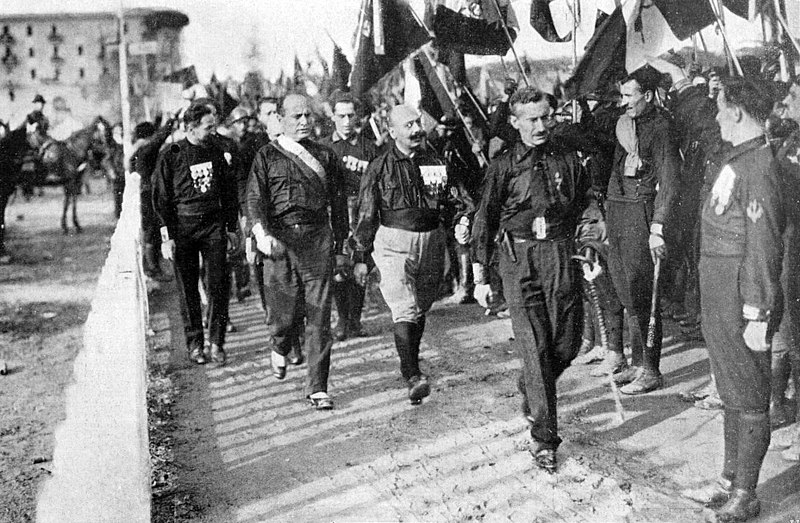
“Greatest Law Giver”: The Truth behind Churchill’s Mussolini Bouquets
“Greatest Law Giver” is excerpted from an article for the Hillsdale College Churchill Project. For the unabridged text including endnotes, please click here. Subscriptions to this site are free. You will receive regular notices of new posts as published. Just fill out SUBSCRIBE AND FOLLOW (at right). Your email address will remain a riddle wrapped in a mystery inside an enigma.
Law giver Musso
Dr. Antoine Capet, author of the indispensable Churchill: Le dictionnaire (2018) is developing an expanded English edition. “I am currently engaged on the Mussolini entry,” he writes….
Naturally I quote Churchill’s words of 17 February 1933 to the Anti-Socialist and Anti-Communist Union in London. He described Mussolini’s ‘Roman genius’ and called him ‘the greatest law giver among living men.’ Martin Gilbert first published these quotes in 1976. As you point out in Churchill by Himself, Robert Rhodes James provides only a truncated version of the speech in his Complete Speeches. All search results derive from Gilbert. I suspect that Churchill’s speech was never published.
Churchill’s actual words
As Chancellor of the Exchequer in 1927, Churchill negotiated Italy’s payment of her war debt to Britain, which Mussolini was still honoring in 1933. Politicians often say nice things about foreigners who owe them lots of money. But this is too flippant, and there is more to the question.
Dr. Capet is right that the full speech was never published. Allen Packwood, director of the Churchill Archives Centre, came to our rescue. He supplied the next best thing: Churchill’s original speech notes, corrected in WSC’s own hand. The methodical Sir Martin read and quoted from this document years ago when researching the Churchill official biography. What he wrote was a model of fairness and balance:
During the course of his speech Churchill praised “the Roman genius” of Mussolini, whom he described as “the greatest law giver among living men,” for his anti-Communist stance, but he rejected Fascism as a model for Britain. “It is not a sign-post which would direct us here,” he said, “for I firmly believe that our long experienced democracy will be able to preserve a parliamentary system of government with whatever modifications may be necessary from both extremes of arbitrary rule.”
The speech was not about the “law giver.” A few days before Churchill spoke, the Oxford Union had approved a motion: “That this House refuses in any circumstances to fight for King and Country.” Churchill compared this “squalid, shameless avowal” with more robust attitudes abroad, “where great nations stand determined to defend their national glories or national existence with their lives.”
Rejecting fascism
Churchill had consistently declared that Italian fascism was inadmissible in the British democracy. In Rome in 1927 he had told reporters: “If I had been an Italian, I am sure I should have been whole-heartedly with you…against the bestial appetites and passions of Leninism. But in England we have not yet had to face this danger in the same deadly form. We have our own way of doing things.”
In 1933 he was simply repeating that view, but he is repeatedly quoted out of context to assert the opposite. The “law giver” phrase comes up 13 times in his words or speeches. Five of the first six are in books by hostile biographers. Each truncates the quote to avoid any suggestion that Churchill qualified his remark. No one reproduces the full context. Instead they imply that he was at home with fascism and dictatorship.
“Subsidiary craters spouting forth”
When the son of an unpopular minister entered Parliament, Churchill cracked: “Isn’t it enough to have this parent volcano continually erupting in our midst? And now we are to have these subsidiary craters spouting forth the same unhealthy fumes!”
Law giver Mussolini continues to surface in Churchill attack books. The latest of these (2021) adds: “These were grotesque words to use about a posturing mountebank whose brutish followers beat up his opponents…. The Nottingham Evening Post’s headline ‘Winston a fascist’ may have been a little sharp…” A little?
One gesture of balance was Nicholas Farrell’s in The Spectator. A Mussolini biographer, Farrell asserted Churchill’s admiration, but provided the “law giver” quote in full context. (Less commendably, Farrell relied on Clare Sheridan’s claim that Churchill was “the likely leader of the Fascisti party in Britain.” That flies in the face of Churchill’s own words, and Sheridan was anything but a serious observer.)
Reality
Wanting someone to defeat someone else—like Churchill wanted Mussolini to defeat communism—does not mean you espouse someone’s politics. Approving Mussolini’s victory in 1923 does not make Churchill a fascist.
The critics then say: Well, if Churchill was not a fascist himself, he sympathized with them. As so often, investigation of what he actually said leads us to entirely different conclusions. Yes, Churchill expressed admiration for Mussolini, publicly and privately, until he allied with Hitler. Yes, if forced to choose between Italian fascism and Italian communism, Churchill unhesitatingly would choose the former. No, Churchill never believed in fascism as acceptable in a democracy.
Further reading
“The Churchill-Mussolini Non-Letters,” 2015
“Mussolini’s Consolation” (Churchill Quotes,” 2012
“Cole Porter and a Vanished Culture: Brewster and Mussolini,” 2020






